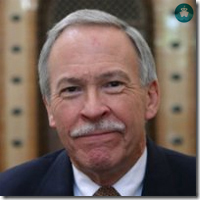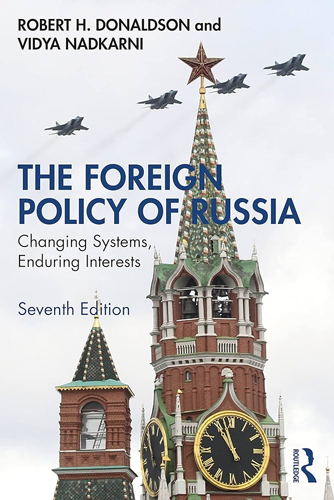 |
 |
 |
 |
 |
 |
 |
 |
 |
 |
| Dr. Robert Donaldson |
 |
| Political Science & World Affairs |
 |
| Ph.D., Russian and American Foreign Policy |
 |
 |
| Coming from: |
 |
Tulsa, Oklahoma USA |
 |
 |
| Contact details: |
 |
|
 |
| EXPERTISE |
| Politics & Current Affairs |
| World Affairs |
|
 |
 |
 |
| PREVIOUS EXPERIENCE WITH: |
               
|


Robert (“Bob”) Donaldson retired after 45 years of College teaching in Political Science, specializing on Russian and American Foreign Policy and World Politics. At the University of Tulsa, where he was President in the 1990s, he was chosen “Faculty Member of the Year” in 2013. Earlier he was President of Fairleigh Dickinson University and a professor and administrator at Vanderbilt University and the City University of New York.
Dr. Donaldson has three degrees from Harvard and is author or co-author of 6 books and two dozen articles and book chapters. The sixth edition of The Foreign Policy of Russia: Changing Systems, Enduring Interests, was published in October 2018. A member of the Council on Foreign Relations and former President of the American Committees on Foreign Relations, he has also served as a consultant in the U.S. intelligence community.
In addition to teaching at 4 universities, he has spoken to Foreign Relations Committees in 25 cities and has lectured for the U.S. State Department in Europe and the Indian Sub-continent. He has made 20 trips to Russia since 1969, and has led four study tours there. He was host on the Tulsa campus to important Russian political figures and also brought to the faculty Russia's great poet, Yevgeny Yevtushenko. Dr. Donaldson has also traveled extensively to other areas of the world, including 12 visits to the Middle East and several trips to South and East Asia.

(Click images for full size)


CRUISE TOPICS: WORLD AFFAIRS
Global Threats in the Twenty-first Century (3 lectures)
Part I: How did we get to this place in history, and why does it seem so dangerous here?
Relying on Cold War-era approaches and institutions in a post-Cold-War era has led to frustration and failure for the Western powers as challenges from non-state actors multiply.
Part II: Responding to the Threats: “Nation-Building” and its Alternatives
After the Iraq and Afghanistan wars, while few doubt that the U.S. and its European allies have the will or resources to continue the post-2001 “global war on terror,” some critics believe the U.S. and its NATO allies need to rein in their global presence while others emphasize the need for even more Western attention and resources to be devoted to “nation-building” in weak and war-torn states as a way of ensuring security. Alternatives to withdrawal and to nation-building need to be closely examined, given the shortcomings of both.
Part III: Where should America and its Western allies go from here, and why does it seem so difficult to move forward?
The challenges of formulating a grand strategy to meet contemporary threats are many, but the Western powers need to prepare their publics for a future where unconventional dangers demand new approaches.
Global Trends & Alternative Futures: Intelligence Forecasts for 2040
Washington’s foremost intelligence analysts, who constitute the National Intelligence Council, have recently issued an examination of the major trends that will shape the global scene in 2040, and an assessment of the likelihood of alternative “futures.” We will visit the major findings of this important report, exploring the likely consequences for various regions of the globe.
America’s Failed Search for a Post-Cold War Strategy
In the aftermath of the Cold War, the U.S.—far from withdrawing from global engagement--sought to utilize its “unipolar moment” as the “indispensable” leader of an alliance of democracies to foster the norms of a “liberal international order.” Especially after 9/11 the U.S. and its partners utilized primarily military power to conduct a “war on terror” that ultimately collapsed in failure. Where did Washington and its NATO allies go wrong, and what alternatives now present themselves?
Climate Change: The Impact on the Region
Understand the connection between climate change and the very unfavorable weather patterns (stronger hurricanes, changing rainfall amounts, higher temperatures) in the Caribbean and North Atlantic region.
Why Nation-Building Hasn’t Worked
Western efforts to reshape failing autocracies into Jeffersonian-style democracies have incurred great costs in lives and treasures and left countries like Iraq, Afghanistan, and Libya in total disarray. What was it about the nation-building project that was misguided, and what alternatives does Washington have as it seeks to deal with resurging global disorder?
Vladimir Putin: Ambition and Frustration
Departing from his long-cultivated reputation as a rational, calculating chess player, Russia’s president shocked the world by launching a brutal war in Ukraine. To understand the origins of this conflict, we examine Putin’s career and the evolution of his foreign policy orientation.
Cyber-Space: An Exploding Threat Environment
Until the beginning of the 21st century, national security threat assessments in most of the West would not have prominently included the various forms of cyber-attacks. But now some experts argue that cyberspace has indeed become the arena for some of the most formidable threats to global security that leave us facing more probable risks than those posed by modern weapons and warfare.
China’s Rise and the Growing Threat to the Global Order
Learn how Beijing built its global economic strength and has utilized an ambitious economic and infrastructure investment strategy, along with a more assertive military posture, to seek primacy and threaten not only the security of the Pacific Ocean region but also the greater global order.
The Volatile Middle East (3 lectures)
Part I: The Volatile Middle East: After the “Arab Spring”
Beginning with a street vendor’s suicide in Tunisia, the popular movement against authoritarian regimes known as the “Arab Spring” quickly spread through the region, toppling authoritarian regimes in Egypt and Libya, igniting civil war in Syria, and threatening royal families in the Gulf region. And yet democratic change has taken root only in the country where the protests begin. We will survey the regions and assess the causes of the failure and the conditions for democratic change.
Part II: The Volatile Middle East: What Options for the West?
Following the collapse of hopes for a democratic awakening in the region, continuing crises and terrorist threats in the Middle East grab the attention of European and American policy-makers, raising the question of how involved—and how militarily committed--the U.S. and its allies must continue to be in this volatile region.
Part III: The Volatile Middle East: Israel’s Search for Security
For decades, the central conflict in the Middle East—Israel’s struggle against Palestinians and their Arab supporters who deny its right to exist—has focused global attention—and rivalries--on this regional conflict. Fifty years after the 1967 war that gave Israel possession of territories formerly in Arab hands, the search for a secure peace continues to bedevil internal politics of the regional actors as well as the international community.
Italy, Greece, Turkey, and the EU’s Migrant Crisis
Since 2014 more than 10,000 people have died attempting to cross the Mediterranean to European shores. Already destabilized by monetary and fiscal crises, Greece and Italy have been especially hard-hit by the flood of migrants toward the EU, while Turkey has struggled to cope with migrants in the face of internal political crises and regional conflicts. How the European Union manages this crisis will have lasting effect on Europe and the wider international community.
CRUISE TOPICS: DESTINATION LECTURES: RUSSIA (4 lectures)
Part I: How Russia’s Geography and Climate Helped Shaped the Russians
How has the “national character” of Russians been molded by vast expanse and forbidding climate?
Part II: The Enduring Legacy of the Tsars
A century later, Russia’s politics, society and culture reflect her imperial tsarist past.
Part III: USSR Redux? Is Putin Trying to Resurrect Moscow’s Empire?
Vladimir Putin will become less enigmatic as we examine his background, personality, and policies, and conclude with an analysis of conflicting perceptions of the crisis in the Ukraine and its implications for future Russian policy.
Part IV: How Much of the USSR’s Legacy Lingers in Today’s Russia?
After 25 years, it is still impossible to understand Russia without understanding the Soviet legacy.


Robert has lectured on Crystal, Azamara ("World Affairs"), Viking Ocean, and Celebrity (destination: Russia, Mediterranean).
Twelve engagements since 2014.
Good reviews and good attendance.
Ship: Queen Elizabeth
Ref: Q213N
Cruise Description: Panama Canal Discovery
Nights: 14
Sailing From: Ft Lauderdale
Departure Date: 5/14/22
Ship: Queen Mary
Ref: M301
Cruise Description: Caribbean Celebration
Nights: 12
Sailing From: New York
Departure Date: 12/22/22
Ship: Queen Mary
Ref: M304
Cruise Description: Dubai to Singapore
Nights: 12
Sailing from: Dubai
Departure Date: 2/2/23
The following recent Cruise History has been recorded for this candidate.

 |
SHIP |
REF |
 |
CRUISE DESCRIPTION |
NIGHTS |
SAILING FROM |
DEPARTURE DATE |
 |
 |
 |
Silver Shadow
| SS240510016 |
Alaska & the Inside Passage |
16 |
Seward (Anchorage), Alaska |
Monday, May 6, 2024 |
 |
Splendor
| SPL240331 |
Transatlantic Crossing |
14 |
Miami, Florida |
Sunday, March 31, 2024 |
 |
Diamond Princess
| M344 |
10-Day Thailand & Vietnam |
10 |
Singapore |
Saturday, December 16, 2023 |
 |
Queen Mary 2
| M001 |
Caribbean Cruise |
12 |
New York |
Sunday, December 22, 2019 |
 |
Queen Mary 2
| M911 |
Eastbound Transatlantic Crossing |
7 |
New York |
Sunday, May 5, 2019 |
 |
Queen Victoria
| V904 |
Atlantic Crossing |
11 |
Southampton |
Thursday, January 10, 2019 |
 |
Crystal Symphony
| V7225 |
Around the Cape of Good Hope |
13 |
Port Louis |
Saturday, December 9, 2017 |
 |
Viking Star
| ST171109 |
Cities of Antiquity & the Holy Lands |
14 |
Civitavecchia (for Rome) |
Thursday, November 9, 2017 |
 |
Viking Star
| ST171026 |
Cities of Antiquity & the Holy Lands |
14 |
Piraeus (Athens) |
Thursday, October 26, 2017 |
 |
Crystal Symphony
| V7205 |
Far East Overtures |
13 |
Singapore |
Tuesday, March 7, 2017 |
 |
Crystal Symphony
| V6231 |
Isles of the South Pacific |
11 |
Papeete, Tahiti |
Friday, December 9, 2016 |
 |
Viking Star
| ST160515 |
Viking Homelands |
14 |
Stockholm |
Sunday, May 15, 2016 |
 |
Viking Star
| ST160501 |
Viking Homelands |
14 |
Bergen |
Sunday, May 1, 2016 |
